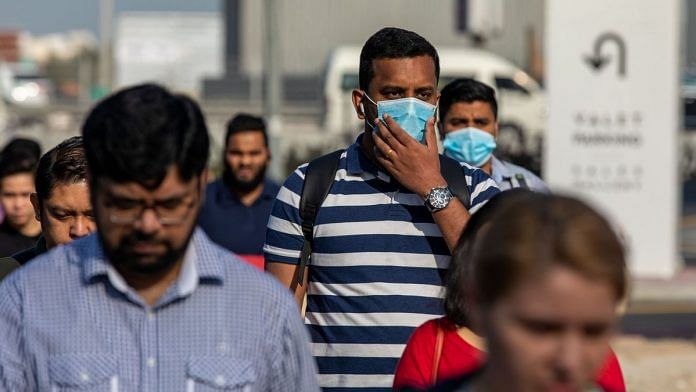Drastic global measures to keep populations apart and slow the spread of the coronavirus could remain in place for months. That’s posing the difficult question of how long hundreds of millions of us can keep this Herculean effort going.
The signs from Asia, where the disease first appeared, aren’t encouraging. China, Hong Kong, Singapore and Taiwan have been mobilized since January. The strain is showing, with complacency emerging as the first wave of infections ebbs. Imported cases are on the rise, raising the risk of a second wave. If that happens, President Xi Jinping’s celebrated visit to Wuhan this month may start to look as premature as U.S. President George W. Bush’s infamous “mission accomplished” speech in 2003.
No one knows the precise secret to sustaining good behavior in a pandemic of this scale and potential duration. Complicated ethical issues arise around personal freedoms and privacy. But we know from studies of past outbreaks, including severe acute respiratory syndrome in 2002-03, that there are steps authorities can take, including communication and targeted financial support that allow everyone to act responsibly.
It’s hard to overstate the importance of individual conduct when vaccines are unavailable, the supply of antiviral drugs and ventilators is limited, and transmission of the virus can happen before symptoms set in. With carriers hard to spot, social distancing — staying home, in essence — is the single most effective means of holding back the spread, preventing hospitals from becoming overwhelmed and sliding into emergency triage. This was true during the Spanish Flu of 1918, and remains so. Consider the study released this week by Imperial College in London, which estimated that without controls and changes to individual behavior, 81% of the U.S. and British populations would get the novel coronavirus, resulting in 2.2 million American deaths and 510,000 in Great Britain. It was enough to prompt both governments to tighten measures.
Getting people to behave when danger is real and present isn’t as troublesome as getting them to act before and, especially, after the peak. That’s a problem when some risk may well remain until an effective vaccine is released — perhaps 18 months from now, meaning closures could continue in some form, or return intermittently.
Humans simply aren’t able to sustain a state of high vigilance. They falter. For doctors and nurses during SARS, and in China during the Covid-19 outbreak, fatigue proved deadly. It can prove fatal for the wider population too, as restrictions soften. Past pandemics show that second waves can be painful: During SARS, Toronto was declared free of local transmission, relaxed precautions and found a single hospital ward at the center of a second outbreak a week or so later.
So what does Asia’s experience tell countries that are just embarking on a period of indefinite shutdowns?
One is that patience eventually strains. The SARS experience put populations on alert in China, Singapore and particularly Hong Kong, as my colleague Nisha Gopalan has written. Yet that can encourage a belief that the current epidemic will, like SARS, ebb and disappear in the summer — possible, but not certain. Bars in central Hong Kong are no longer empty. Singapore has already warned against complacency.
Singapore and Hong Kong, trading cities that depend on the movement of people, are especially vulnerable once borders reopen. Neither experienced a real first wave of infections, so wouldn’t be on China’s war footing either.
We have also learned that coercion works — in the short term. It’s unclear whether it can be effective for long or indeed at all outside China, where drones monitored mask usage, roadblocks were put up and people with mild infections were separated from their families in mass isolation centers. Success in reducing infections doesn’t make such measures sustainable, or desirable.
This brings us back to personal conduct and responsibility. Culture may matter less than is often considered. Governments have to be trusted. That means being clear, transparent and speaking with one voice. Without good communication, authorities simply won’t be able to command the confidence of populations. That imperils their ability to tighten and loosen restrictions as the epidemic shifts, which is fundamental to easing the economic pain.
This is certainly challenging for governments like Hong Kong, where the leader’s approval rating sank to a single-digit percentage last month — or the U.S., where President Donald Trump was initially dismissive of the potential risk from the virus. Britain’s volte-face won’t have helped either.
But it’s possible to do better. Singapore’s prime minister has struck the right note, shoring up morale. Taiwan has daily, live-streamed press conferences. South Korea’s success has been based on data, transparency and testing. Perhaps the best recent example is from Europe — Leo Varadkar, Ireland’s prime minister, outlined the grim risk of 15,000 cases by the end of the month, but also the country’s ability to contain the worst.
Nudging may not always be enough. Emergency powers may still be necessary, to suspend meetings, close public places, and isolate the sick and at-risk. They may be the only way to stop potentially lethal crowds, like the Malaysian religious gathering that prompted a lockdown. Yet using police to impose basic stay-at-home demands can rapidly overwhelm law enforcement, and raise resentment. Self-policing is more effective.
The catch is that, like corporations, most households haven’t squirreled away enough cash to manage a months-long shutdown. That means targeted handouts, as soon as possible, reaching the most vulnerable sections of the population. Governments will need to keep dispensing cash and bear the budget deficit pain — or accept virus consequences.-Bloomberg
Also read: By failing to scale up testing coronavirus, India may have lost crucial time



